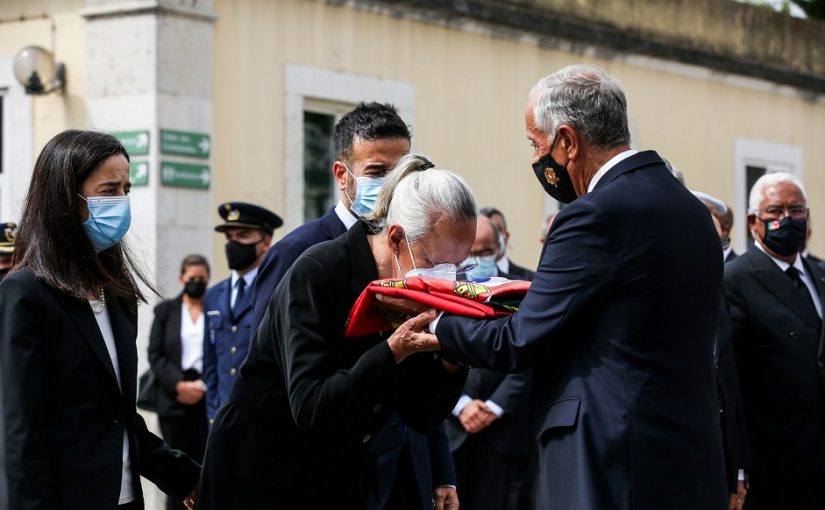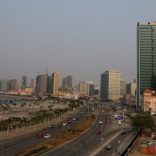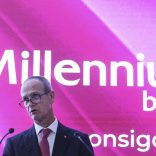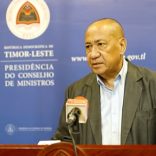Angola hikes diesel price again to bolster public finances
Portugal: State tribute, applause and cheers for freedom for late president

Photo: Lusa
The Portuguese bid farewell on Sunday to former President Jorge Sampaio in a solemn ceremony with the main figures of the state and foreign guests and with “cheers for freedom” near the Jeronimos Monastery in Lisbon.
The three main state figures, the President Marcelo Rebelo de Sousa, the speaker of parliament, Ferro Rodrigues, and the prime minister, António Costa, recalled the political career of Jorge Sampaio, who died on Friday at the age of 81.
His political life began during the dictatorship, in the 1960s as a student leader, he was a lawyer for anti-fascist militants, some of them from the Portuguese Communist Party, he was secretary-general of the Socialist Party, mayor of Lisbon (1990-1995) and president of Portugal (1996-2006).
“He never wanted to be a hero, but he became one,” Marcelo Rebelo de Sousa summed up in a final tribute to the former president, also stating that he “loved Portugal through fragility” and “not through strength”.
His two children, Vera and André Sampaio, remembered their father as “a good man” who knew that in life and politics “, nothing can be done alone”.
“Our father was a good man, attentive and available, for whom people counted above all, not people in general, but each person with a name and a face,” stressed his daughter.
André Sampaio, visibly moved, remembered his father as a man who was “popular without being populist, always close without ever trivialising closeness, who was a statesman and simultaneously an ordinary citizen, who was loved without liking to be venerated”.
This was followed by the words of Prime Minister António Costa, who, as a young man, trained in Sampaio’s law firm and was his campaign director in the 1996 presidential election, in which he beat the right-wing candidate, Cavaco Silva.
Portuguese democracy, he said, “can and should be proud to have been served by a great politician like Jorge Sampaio, and the country should be proud to have been presided over by an exemplary citizen like him”.
In the final part of his speech, he recalled Sampaio’s words in his inaugural speech as president in 1996 in parliament: “There are no expendable Portuguese.”
Ferro Rodrigues, who joined the Socialist Party the same year as Sampaio, in 1978, recalled “the friend” who “chose to put his qualities at the service of causes” and whose example “will certainly endure and inspire many generations”.
“Jorge Sampaio was an illustrious Portuguese, and his example will certainly endure and inspire many generations,” he said.
Marcelo Rebelo de Sousa, the current president but who was his opponent in the 1989 local elections when Sampaio won the Lisbon city council with a left-wing coalition, gave the last speech at the ceremony that ended with the national anthem.
“He loved Portugal through fragility and so often in fragility. More than that, he made this fragility, his, our, all of our strength,” he said.
“He never wanted to be a hero, but he became one, in so many of his life’s actions, heroic. Of that discreet heroism, more lyrical than epic, sweeter than impulsive. Firm but sweet. And that is also why we remember him so sweetly. And we thank him for the love he never denied Portugal, for the way he loved Portugal,” Rebelo de Sousa added.
At the ceremony in the cloisters of the Jeronimos Monastery, the “Lacrimosa” from Mozart’s Requiem was played by the Choir of the National Theatre of São Carlos and the Portuguese Symphony Orchestra, and Jorge de Sena’s poem “A tiny light” was recited.
After the wake, on Saturday, which thousands of people attended, hundreds of people again stood in front of the Jerónimos Monastery this morning.
When the funeral procession left, there was again applause and slogans such as “Long live freedom”, “Long live Jorge Sampaio”.
After the evocative session at Jerónimos and the military honours at the Alto de São João cemetery, Lisbon, there was a short moment reserved for family and friends, who accompanied the coffin to the grave where it was laid to rest.
Former President of the Republic Jorge Sampaio died on Friday at the age of 81.
Before 25 April 1974, he was one of the protagonists of the academic crisis of the early 1960s, which generated a long and widespread movement of student protest against the Estado Novo. As a lawyer, he defended political prisoners during the dictatorship.
Head of State for ten years, after his Presidency, he was appointed in 2006 by the Secretary-General of the United Nations Special Envoy for the Fight against Tuberculosis. Between 2007 and 2013, he was UN High Representative for the Alliance of Civilisations.
Until his death, he chaired the Global Platform for Syrian Students, which he founded in 2013 to contribute to the academic emergency that the conflict in Syria had created, leaving thousands of young people without access to education.












Leave a Reply
Be the First to Comment!
You must be logged in to post a comment.
You must be logged in to post a comment.